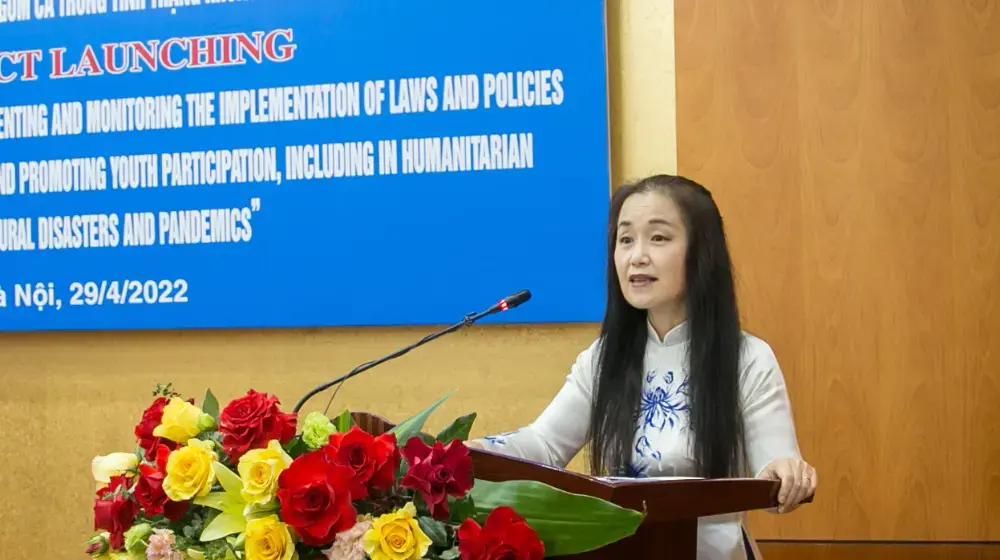Mr. Nguyen Anh Tuan, Secretary of Youth Union;
Mr. Nguyen Dang Minh, Director of Youth Affairs, Ministry of Home Affairs;
Mr. Nguyen Thanh Hao, Director of Central Center for Adolescents and Youth;
Representatives from the Ministry of Health, Ministry of Education and Training, Ministry of Home Affairs and Youth Union;
Representatives of young people, particularly the awarded youth-led groups;
Ladies and gentlemen,
Good morning to you all.
On behalf of the United Nations Population Fund (UNFPA) in Viet Nam, I would like to thank the Central Center for Adolescents and Youth (CCAY) of the Youth Union for organizing this exciting event. I very much appreciate the CCAY's great support over the past 11 months in coordinating all activities of the six youth-led groups, which won a competition on innovative ideas to improve young people’s access to sexual and reproductive health information and services.
Taking this opportunity, I would like to congratulate the six youth-led groups for your achievements so far.
I would also like to thank our colleagues from the Ministry of Home Affairs and Ministry of Health for joining us today, as well as commend their efforts to improve young people’s sexual and reproductive health and to promote young people's participation in the development and implementation of youth-friendly sexual and reproductive health policies and programmes in Viet Nam.
Distinguished guests,
Viet Nam was very successful in meeting most of the Millennium Development Goals ahead of the 2015 deadline. Yet critical gaps remain in important social development aspects, including issues related to young people. For instance, one third of Vietnamese young people continue to face barriers when accessing reproductive health information and services. Certain groups, such as young migrants and ethnic minority youth, have only limited access to SRH information and services. Young people often have difficulties in accessing education they want, finding suitable employment, or creating their own jobs after they graduate schools. As part of the global efforts to achieve the new Sustainable Development Goals, also called Agenda 2030, these challenges must be addressed under the principle of “leave no one behind”.
In the context of dynamic socio-economic development in Viet Nam, sexual values, norms and behaviors among Vietnamese young people has been changing rapidly. Young people are getting married later and have more sexual relationships before marriage. More and more young people move to urban areas to study or work. Therefore, we need new kinds of programmes, which respond to their sexual and reproductive health needs.
In addition, most Vietnamese young people still lack vital knowledge and life-skills to negotiate safe and consensual relationships, and face considerable barriers to accessing SRH services. Sexuality education at schools remains limited. For example, you may recall a recent news article that a young couple in northern Viet Nam was hospitalized because they used, instead of a condom, a plastic bag for their first intercourse.
The SRH/FP programmes traditionally target married couples, and no specific national programme addressing the growing needs of unmarried young people has yet been implemented. As a consequence, young people are at risk of early and unintended pregnancies, unsafe abortion, and sexually transmitted infections including HIV.
Ladies and gentlemen,
In this context, I would like to highlight the following three messages:
First, the participation of young people in designing and analyzing the policies that affect them is one way to ensure that the policies and services respond to their actual needs. Evidence shows that working in partnership with young people is an essential component of any successful youth programmes.
Second, it is essential to embrace diversity among young people. We need to ensure that young people from all parts of the society, including those who are in a vulnerable situation, have an equal opportunity to participate in policy dialogue and in the implementation of programmes that affect their lives. In this sense, we are very happy that two out of the six selected projects support young people with disabilities.
Last but not the least, I recommend the YU and MOHA to continue to play a leading role in promoting substantive youth participation and engaging young people in policy discussion. Both organizations have done a lot to make good progress in youth participation, but we believe that more must be done. UNFPA stands ready to support you in your continuous efforts. By working together, we can make universal access to sexual and reproductive health for all Vietnamese young people become a reality.
Distinguished guests,
At today’s event, we are going to complete the one year implementation of the youth-led initiatives on SRH. The video clip about the implementation of these initiatives that we will see in some minutes confirms that young people are not just beneficiaries, but they are agents of change, and have great capacity to contribute to improving access to SRH services and information when such an opportunity is available. We, adults, need to create a supportive environment and work in collaboration with young people to help them realize their full potential.
Thank you very much for your attention and I wish you all good health, happiness and success.
Youth Led Initiative on Promoting access to sexual and reproductive health information and services for youth and adolescents



